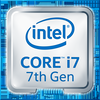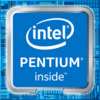Intel Core i7-7700T vs Intel Core i5-13500T vs Intel Pentium Gold 4410Y
Intel Core i7-7700T
► remove from comparison
Der Intel Core i7-7700T ist ein High-End Quad-Core Desktop-Prozessor auf Basis der Kaby-Lake-Architektur, der Anfang 2017 vorgestellt wurde. Im Vergleich zu dem deutlich schnelleren Core i7-7700K ist der Core i7-7700T geringer getaktet aber auch deutlich sparsamer mit einem TDP von 35 Watt.
Performance
Die Performance des Intel Core i7-7700T liegt knapp oberhalb eines Core i5-7600K durch die geringere Taktung. Zur Zeit der Erscheinung ist er der schnellste 35-Watt-Desktop-Prozessor der Kaby-Lake-Serie von Intel. Auch anspruchsvollste Programme und Spiele werden von der High-End-CPU problemlos bewältigt.
Grafikeinheit
Für Grafikberechnungen zeigt sich die im Prozessor integrierte Intel HD Graphics 630 mit 24 EUs (Execution Units) verantwortlich, die mit 350 - 1150 MHz taktet. Die Leistung ist vergleichbar mit der alten Intel HD Graphics 530 und siedelt sich daher im absoluten Low-End-Bereich an, sodass aktuelle Spiele allenfalls in niedrigen Einstellungen flüssig dargestellt werden.
Intel Core i5-13500T
► remove from comparisonDer Intel Core i5-13500T ist ein schneller und sehr sparsamer Desktop-Prozessor auf Basis der Raptor-Lake-Architektur, die bereits im Oktober 2022 vorgestellt wurde. Der Prozessor bietet einen Basistakt von 1,6 GHz und erreicht bis zu 4,6 GHz im Turbo. Die hybride CPU-Architektur, welche mit Alder-Lake eingeführt wurde, kommt auch den Raptor-Lake-Prozessoren zugute. Der Namenszusatz T steht hierbei für ein besonders sparsames CPU-Modell und mit einer TDP von nur 35 Watt (PL1 = 35 Watt) sind diese Prozessoren für kleine, kompakte Systeme bestens geeignet.
Performance
Die geringe Leistungsaufnahme sorgt schlussendlich für eine etwas geringere Leistung im Vergleich zum Intel Core i5-13500. Je nachdem, wie das PL2 (92 Watt) definiert ist, kann es bei der Multi-Core-Leistung spürbare Unterschiede geben. Im Vergleich zum Intel Core i5-12500T ist der Intel Core i5-13500T aufgrund der höheren Anzahl an physischen Rencheneinheiten überlegen.
Grafikeinheit
Wie auch der Intel Core i5-12500T bietet der Intel Core i5-13500T eine integrierte Grafikeinheit. Als Basis dient weiterhin die Intel Iris Xe-Architektur. Rein leistungstechnisch hat sich bei der neuen Intel UHD Graphics 770 aber nicht viel verändert. Die iGPU des Intel Core i5-13500T taktet zudem 100 MHz höher, was aber keinen spürbaren Unterschied im Alltag ergibt.
Leistungsaufnahme
Die TDP des Intel Core i5-13500T beläuft sich auf 35 Watt, mit der Option, diese im Turbo auf bis zu 92 Watt zu erhöhen. Gegenüber dem Intel Core i5-12500T (PL2 = 74 Watt) steigt der maximal mögliche Energiebedarf etwas an.
Intel Pentium Gold 4410Y
► remove from comparison
Der Intel Pentium Gold 4410Y ist ein extrem sparsamer Dual-Core-SoC für Tablets und passiv gekühlte Notebooks, der auf der Kaby-Lake-Architektur basiert und im Q2 2017 vorgestellt wurde. Er basiert auf den Core m3-7Y30, jedoch ohne Turbo Boost und daher fixen 1,5 GHz Taktfrequenz. Dank Hyper-Threading kann der Prozessor vier Threads gleichzeitig bearbeiten. Weiterhin integriert der Chip eine Intel HD Graphics 615 Grafikkarte, einen Dual-Channel-Speichercontroller (DDR3L/LPDDR3) sowie VP9- und H.265-Videode- und -encoder. Die Fertigung erfolgt weiterhin in einem 14-Nanometer-Prozess mit FinFET-Transistoren.
Architektur
Im Vergleich mit Skylake hat Intel die zugrundeliegende Mikroarchitektur praktisch unverändert übernommen, sodass sich keine Unterschiede in der Pro-MHz-Leistung ergeben. Überarbeitet wurde lediglich die Speed-Shift-Technik zur schnelleren dynamischen Anpassung von Spannungen und Taktraten, zudem gestattet der gereifte 14-Nanometer-Prozess deutlich höhere Frequenzen und eine bessere Energieeffizienz als bislang.
Performance
Der Pentium 4410Y positioniert sich unterhalb der Core-m3 Prozessoren und ist mit 6 Watt TDP auch etwas höher eingestuft (kann jedoch per TDP-down auf 4,5 Watt heruntergestuft werden). Die Leistung ist durch den fehlenden Turbo Boost besonders im Einzelkernbetrieb und bei kurzen Leistungsspitzen spürbar schwächer als der Core m3-7Y30. Der etwas schnellere Pentium 4415Y bietet 100 MHz mehr Taktfrequenz der Prozessorkerne.
Grafikeinheit
Die integrierte Intel HD Graphics 615 Grafikkarte verfügt wie die alte HD Graphics 515 über 24 Ausführungseinheiten (EUs) und taktet in diesem Fall mit 300 bis 850 MHz. Die Performance hängt stark von der eingestellten TDP sowie dem verwendeten Arbeitsspeicher ab; mit schnellem LPDDR3-1866 im Dual-Channel-Betrieb und angehobener Leistungsaufnahme dürfte die GPU gelegentlich an die Leistung der HD Graphics 520 herankommen, kann in anderen Fällen aber auch deutlich langsamer sein. Aktuelle Spiele des Jahres 2016 werden, wenn überhaupt, nur in niedrigsten Einstellungen flüssig dargestellt.
Anders als Skylake kann Kaby Lake nun auch H.265/HEVC im Main10-Profil mit 10 Bit Farbtiefe sowie Googles VP9-Codec in Hardware decodieren.
Leistungsaufnahme
Die Fertigung erfolgt in einem weiter verbesserten 14-Nanometer-Prozess mit FinFET-Transistoren, wodurch die Energieeffizienz nochmals spürbar gestiegen ist. Die TDP ist mit 6 Watt etwas oberhalb der Y-Serie (4,5 Watt) eingestuft, kann jedoch vom Notebookhersteller auf 4,5 Watt abgesenkt werden (TDP-Down).
| Model | Intel Core i7-7700T | Intel Core i5-13500T | Intel Pentium Gold 4410Y | ||||||||||||||||||||||||||||||||||||||||||||||||||||||||||||||||||||||||||||||||||||||||||||||||||||||||||||||||||||||||||||||||||||||||||||||||||||||||||||||||||||||||||||||||||||||||||||||||||||||||||||||||||||||||||||||||||||||||||||||||||||||||||||||||||||||||||||||||||||||||||||||||||||||||||||||||||||||||||||||||||||||||||||||||||||||||||||||||||||
| Codename | Kaby Lake | Raptor Lake | Kaby Lake | ||||||||||||||||||||||||||||||||||||||||||||||||||||||||||||||||||||||||||||||||||||||||||||||||||||||||||||||||||||||||||||||||||||||||||||||||||||||||||||||||||||||||||||||||||||||||||||||||||||||||||||||||||||||||||||||||||||||||||||||||||||||||||||||||||||||||||||||||||||||||||||||||||||||||||||||||||||||||||||||||||||||||||||||||||||||||||||||||||||
| Series | Intel Kaby Lake | Intel Raptor Lake-S | Intel Kaby Lake | ||||||||||||||||||||||||||||||||||||||||||||||||||||||||||||||||||||||||||||||||||||||||||||||||||||||||||||||||||||||||||||||||||||||||||||||||||||||||||||||||||||||||||||||||||||||||||||||||||||||||||||||||||||||||||||||||||||||||||||||||||||||||||||||||||||||||||||||||||||||||||||||||||||||||||||||||||||||||||||||||||||||||||||||||||||||||||||||||||||
| Serie: Kaby Lake Kaby Lake |
|
|
| ||||||||||||||||||||||||||||||||||||||||||||||||||||||||||||||||||||||||||||||||||||||||||||||||||||||||||||||||||||||||||||||||||||||||||||||||||||||||||||||||||||||||||||||||||||||||||||||||||||||||||||||||||||||||||||||||||||||||||||||||||||||||||||||||||||||||||||||||||||||||||||||||||||||||||||||||||||||||||||||||||||||||||||||||||||||||||||||||||||
| Clock | 2900 - 3800 MHz | 1600 - 4600 MHz | 1500 MHz | ||||||||||||||||||||||||||||||||||||||||||||||||||||||||||||||||||||||||||||||||||||||||||||||||||||||||||||||||||||||||||||||||||||||||||||||||||||||||||||||||||||||||||||||||||||||||||||||||||||||||||||||||||||||||||||||||||||||||||||||||||||||||||||||||||||||||||||||||||||||||||||||||||||||||||||||||||||||||||||||||||||||||||||||||||||||||||||||||||||
| L1 Cache | 256 KB | 128 KB | |||||||||||||||||||||||||||||||||||||||||||||||||||||||||||||||||||||||||||||||||||||||||||||||||||||||||||||||||||||||||||||||||||||||||||||||||||||||||||||||||||||||||||||||||||||||||||||||||||||||||||||||||||||||||||||||||||||||||||||||||||||||||||||||||||||||||||||||||||||||||||||||||||||||||||||||||||||||||||||||||||||||||||||||||||||||||||||||||||||
| L2 Cache | 1 MB | 11.5 MB | 512 KB | ||||||||||||||||||||||||||||||||||||||||||||||||||||||||||||||||||||||||||||||||||||||||||||||||||||||||||||||||||||||||||||||||||||||||||||||||||||||||||||||||||||||||||||||||||||||||||||||||||||||||||||||||||||||||||||||||||||||||||||||||||||||||||||||||||||||||||||||||||||||||||||||||||||||||||||||||||||||||||||||||||||||||||||||||||||||||||||||||||||
| L3 Cache | 8 MB | 24 MB | 2 MB | ||||||||||||||||||||||||||||||||||||||||||||||||||||||||||||||||||||||||||||||||||||||||||||||||||||||||||||||||||||||||||||||||||||||||||||||||||||||||||||||||||||||||||||||||||||||||||||||||||||||||||||||||||||||||||||||||||||||||||||||||||||||||||||||||||||||||||||||||||||||||||||||||||||||||||||||||||||||||||||||||||||||||||||||||||||||||||||||||||||
| Cores / Threads | 4 / 8 | 14 / 20 6 x 4.6 GHz Intel Golden Cove P-Core 8 x 3.2 GHz Intel Gracemont E-Core | 2 / 4 | ||||||||||||||||||||||||||||||||||||||||||||||||||||||||||||||||||||||||||||||||||||||||||||||||||||||||||||||||||||||||||||||||||||||||||||||||||||||||||||||||||||||||||||||||||||||||||||||||||||||||||||||||||||||||||||||||||||||||||||||||||||||||||||||||||||||||||||||||||||||||||||||||||||||||||||||||||||||||||||||||||||||||||||||||||||||||||||||||||||
| TDP | 35 Watt | 35 Watt | 6 Watt | ||||||||||||||||||||||||||||||||||||||||||||||||||||||||||||||||||||||||||||||||||||||||||||||||||||||||||||||||||||||||||||||||||||||||||||||||||||||||||||||||||||||||||||||||||||||||||||||||||||||||||||||||||||||||||||||||||||||||||||||||||||||||||||||||||||||||||||||||||||||||||||||||||||||||||||||||||||||||||||||||||||||||||||||||||||||||||||||||||||
| Technology | 14 nm | 10 nm | 14 nm | ||||||||||||||||||||||||||||||||||||||||||||||||||||||||||||||||||||||||||||||||||||||||||||||||||||||||||||||||||||||||||||||||||||||||||||||||||||||||||||||||||||||||||||||||||||||||||||||||||||||||||||||||||||||||||||||||||||||||||||||||||||||||||||||||||||||||||||||||||||||||||||||||||||||||||||||||||||||||||||||||||||||||||||||||||||||||||||||||||||
| Socket | FCLGA1151 | LGA 1700 | FCBGA1515 | ||||||||||||||||||||||||||||||||||||||||||||||||||||||||||||||||||||||||||||||||||||||||||||||||||||||||||||||||||||||||||||||||||||||||||||||||||||||||||||||||||||||||||||||||||||||||||||||||||||||||||||||||||||||||||||||||||||||||||||||||||||||||||||||||||||||||||||||||||||||||||||||||||||||||||||||||||||||||||||||||||||||||||||||||||||||||||||||||||||
| Features | DDR3(L)-1600/DDR4-2400 Memory Controller, AVX, AVX2, AES-NI, TSX-NI, Quick Sync, Virtualization, vPro | Intel UHD Graphics 770, DDR5 4800 MT/s, DDR4 3200 MT/s | Dual-Channel DDR3L-1600/LPDDR3-1866 Memory Controller, HyperThreading, AVX, AVX2, Quick Sync, Virtualization, AES-NI, TXT | ||||||||||||||||||||||||||||||||||||||||||||||||||||||||||||||||||||||||||||||||||||||||||||||||||||||||||||||||||||||||||||||||||||||||||||||||||||||||||||||||||||||||||||||||||||||||||||||||||||||||||||||||||||||||||||||||||||||||||||||||||||||||||||||||||||||||||||||||||||||||||||||||||||||||||||||||||||||||||||||||||||||||||||||||||||||||||||||||||||
| iGPU | Intel HD Graphics 630 (350 - 1150 MHz) | Intel UHD Graphics 770 (300 - 1550 MHz) | Intel HD Graphics 615 (300 - 850 MHz) | ||||||||||||||||||||||||||||||||||||||||||||||||||||||||||||||||||||||||||||||||||||||||||||||||||||||||||||||||||||||||||||||||||||||||||||||||||||||||||||||||||||||||||||||||||||||||||||||||||||||||||||||||||||||||||||||||||||||||||||||||||||||||||||||||||||||||||||||||||||||||||||||||||||||||||||||||||||||||||||||||||||||||||||||||||||||||||||||||||||
| Architecture | x86 | x86 | x86 | ||||||||||||||||||||||||||||||||||||||||||||||||||||||||||||||||||||||||||||||||||||||||||||||||||||||||||||||||||||||||||||||||||||||||||||||||||||||||||||||||||||||||||||||||||||||||||||||||||||||||||||||||||||||||||||||||||||||||||||||||||||||||||||||||||||||||||||||||||||||||||||||||||||||||||||||||||||||||||||||||||||||||||||||||||||||||||||||||||||
| $303 U.S. | $161 U.S. | ||||||||||||||||||||||||||||||||||||||||||||||||||||||||||||||||||||||||||||||||||||||||||||||||||||||||||||||||||||||||||||||||||||||||||||||||||||||||||||||||||||||||||||||||||||||||||||||||||||||||||||||||||||||||||||||||||||||||||||||||||||||||||||||||||||||||||||||||||||||||||||||||||||||||||||||||||||||||||||||||||||||||||||||||||||||||||||||||||||||
| Announced | |||||||||||||||||||||||||||||||||||||||||||||||||||||||||||||||||||||||||||||||||||||||||||||||||||||||||||||||||||||||||||||||||||||||||||||||||||||||||||||||||||||||||||||||||||||||||||||||||||||||||||||||||||||||||||||||||||||||||||||||||||||||||||||||||||||||||||||||||||||||||||||||||||||||||||||||||||||||||||||||||||||||||||||||||||||||||||||||||||||||
| Manufacturer | ark.intel.com | ark.intel.com | |||||||||||||||||||||||||||||||||||||||||||||||||||||||||||||||||||||||||||||||||||||||||||||||||||||||||||||||||||||||||||||||||||||||||||||||||||||||||||||||||||||||||||||||||||||||||||||||||||||||||||||||||||||||||||||||||||||||||||||||||||||||||||||||||||||||||||||||||||||||||||||||||||||||||||||||||||||||||||||||||||||||||||||||||||||||||||||||||||||
| TDP Turbo PL2 | 92 Watt | ||||||||||||||||||||||||||||||||||||||||||||||||||||||||||||||||||||||||||||||||||||||||||||||||||||||||||||||||||||||||||||||||||||||||||||||||||||||||||||||||||||||||||||||||||||||||||||||||||||||||||||||||||||||||||||||||||||||||||||||||||||||||||||||||||||||||||||||||||||||||||||||||||||||||||||||||||||||||||||||||||||||||||||||||||||||||||||||||||||||
| Die Size | 215 mm2 | ||||||||||||||||||||||||||||||||||||||||||||||||||||||||||||||||||||||||||||||||||||||||||||||||||||||||||||||||||||||||||||||||||||||||||||||||||||||||||||||||||||||||||||||||||||||||||||||||||||||||||||||||||||||||||||||||||||||||||||||||||||||||||||||||||||||||||||||||||||||||||||||||||||||||||||||||||||||||||||||||||||||||||||||||||||||||||||||||||||||
| max. Temp. | 100 °C | 100 °C |
Benchmarks
Average Benchmarks Intel Core i7-7700T → 0% n=0
Average Benchmarks Intel Core i5-13500T → 0% n=0
* Smaller numbers mean a higher performance
1 This benchmark is not used for the average calculation












